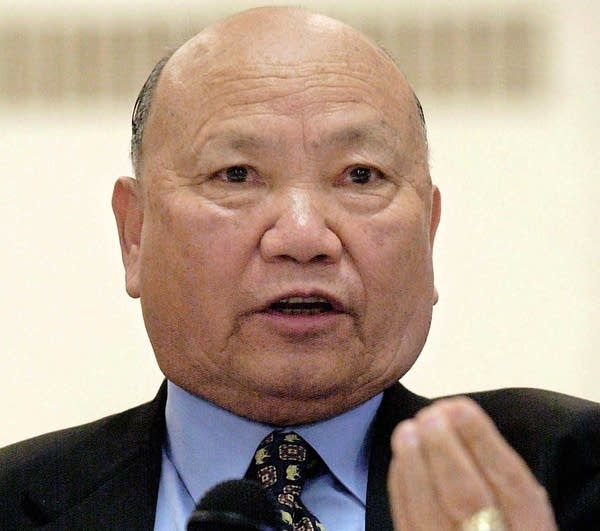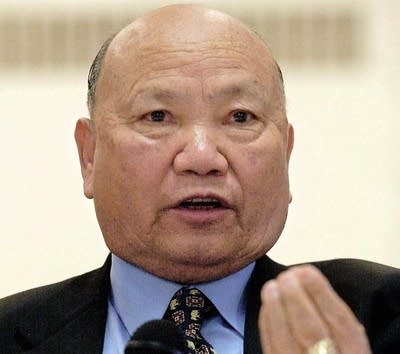Hmong community, military leader Vang Pao dies at 81

Gen. Vang Pao, a key U.S. ally during the Vietnam War, died Thursday near Fresno, Calif. He was 81.
The military leader is described by admirers as a warrior chieftain of the 18 Hmong clans he helped lead.
A FAMILIAR FIGURE
Vang Pao was a familiar figure in Minnesota, home to the country's second-largest Hmong population including some of his family members. Vang Pao and the Hmong living in the hills and jungles of Laos were caught in a deadly squeeze play in the early 1960s.
Create a More Connected Minnesota
MPR News is your trusted resource for the news you need. With your support, MPR News brings accessible, courageous journalism and authentic conversation to everyone - free of paywalls and barriers. Your gift makes a difference.
The invading communist North Vietnamese needed to conquer them to expand their rule throughout Laos and into South Vietnam.
In a December message to followers before his death, Vang Pao explained his reasoning for becoming a United States ally to fight the invaders.
"Without Gen. Vang Pao, the Hmong people would not be here in America."
He said U.S. victories in World War I and World War II led him to believe he was siding with the winners. Instead the U.S. lost the war in l975 and granted Vang Pao and tens of thousands of other Hmong political refugee status.
Lee Pao Xiong, director of the Center for Hmong Studies at Concordia University in St. Paul, said the general led the Hmong resettlement.
"Without Gen. Vang Pao, the Hmong people would not be here in America," Xiong said.
Twin Cities physician and attorney Xuou Thao said Vang Pao traveled the country visiting Hmong population centers to promote economic and educational opportunities for his people.
"He's been at the forefront on a lot of the resettlement issues, creating nonprofit organizations," Thao said. "He spoke a lot to encourage all age groups to work hard and begin our life here in America."
The Hmong did not have a written language while in southeast Asia. Many lived a hand-to-mouth agrarian existence. After resettlement, Vang Pao became a booster for Hmong business owners and office holders.

St. Paul school board member Kazoua Kong-Thao said the general supported her candidacy.
"When I ran for school board, he was very supportive, and he came to my kickoff, he came to my celebration," she said.
As the U.S. began restoring economic ties with southeast Asian countries, Vang Pao opposed any U.S. trade with the communist government in Laos. For years, he favored attempting to replace the Laotian government.
In 2007, he was arrested and charged with other Hmong leaders in federal court with conspiracy in a plot to kill communist officials there. Those charges were dropped in 2009.
A MILITARY LEADER
Vang Pao was first and foremost a military leader.
During World War II, while still a teenager, he fought the Japanese to prevent them from seizing Laos. In the 1950s, he joined the French in the war against the North Vietnamese.

Later, as a general in the Royal Army of Laos, he worked with the CIA to wage a covert war there.
Former CIA Chief William Colby once called Vang Pao "the biggest hero of the Vietnam War," for his 15 years of fighting for the U.S.
Xiong, the Concordia professor, said as the decades passed, Vang Pao's influence waned with younger people.
"He always had that military perspective, the heavy-handed perspective and I think that over time, that perspective kind of rubbed off in the wrong way with many of the younger generations who believed in a diplomatic relationship," he said.
Bittersweet is how St. Paul attorney Stephen Young describes the life of Vang Pao and the fate of the Hmong.
Young, who was an adviser to the general, said the U.S. and Hmong defeat in southeast Asia paved the way for their success in America.
"Only by losing the war there and coming here have the Hmong been able to make this move," Young said. "Fundamentally the Hmong can now contribute as any other American can contribute to our global community."
The family says a funeral for Vang Pao will be held in Fresno, California.
